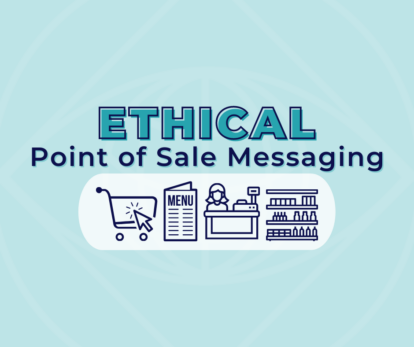Nine tips for starting a vegan business


Today we’re talking about point of sale (POS) messaging, which means a strategic message placed at the final point of product purchase. If you’re a food producer, the point of sale might be a restaurant menu, grocery store shelf, or e-grocer product page. If you make ethically-sourced beauty products, the point of sale might be the farmer’s market or your website’s category page. From a sales perspective, the point of sale is the very bottom of the sales funnel and the last stop in the buyer’s journey.
New consumer research published by the World Resources Institute (WRI) found that displaying “environmental” messages at the point of sale encouraged consumers to choose the vegan option. The WRI’s working paper “Environmental Messages Promote Plant-Based Food Choices: An Online Restaurant Menu Study,” demonstrated a positive correlation between environmental messaging and sustainable food choices.
The authors of the paper surveyed more than 6,000 participants in the US who had no dietary restrictions or pre-existing preferences. They tested five messages, each of which focused on a different ethical “angle,” in the context of an online menu with meat and plant-based options. Two of the messages resulted in a double-digit increase in participants “ordering” the plant-based meals over the meat dishes.
The report concludes that “adding descriptive messages communicating the diverse benefits of plant-based food choices is a flexible and low-cost intervention that requires minimal time investment and is therefore a scalable approach to behavior change.” You can read the full working paper here.
Even though the report focuses on plant-based food decisions, the best performing message focused on the potential for big impacts through small changes. This was the report’s exact language:
“Each of us can make a positive impact for the planet.
Swapping just one meat-based dish for a plant-based one saves greenhouse gas emissions that are equivalent to the energy used to charge your phone for two years.
Your small change can make a big difference.”
This message generated more than double the number of plant-based meal orders than the control group with no messaging!
‘Big impacts through small changes’ is a message from which any ethical, product-based business could benefit. We encourage you to both try and to A/B test* this kind of strategic values-based messaging at all of your points of sale. And as always, please share with the community how it goes!
(* ”A/B testing’ or ‘split testing’ are terms that have gained in popularity in recent years alongside the growth of digital marketing and online retail and services. Yet these terms refer to an age-old concept that is equally relevant to the physical domain – you cannot know what works best in terms of messaging to customers until you try different versions/ideas and measure and compare the results. This Salesforce article provides an overview of A/B Testing in the digital sphere.)